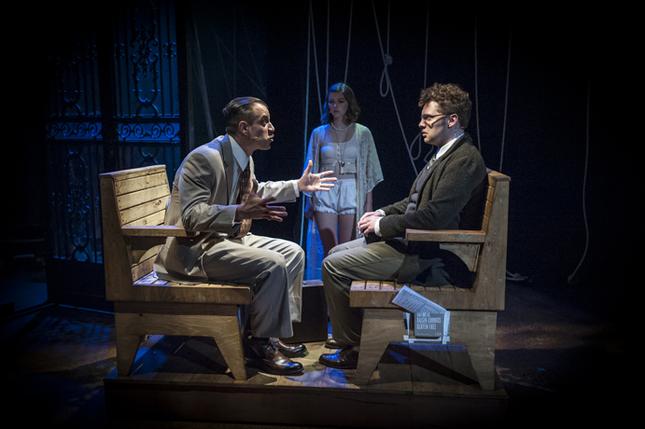GALA Pushes the Envelope with New Musical, ‘Las Polacas’
By • July 16, 2015 0 1208

Over the 40-some years of its existence, GALA Hispanic Theatre, under the leadership of founders Hugo and Rebecca Medrano, has proven to be an eclectic institution that, while culling Spanish-speaking culture for iconic works, has also pushed the envelope with productions of new ones.
Still, in all of its history of bringing receptive Washington audiences classic plays by Spanish authors — from Lope De Vega to Lorca — as well as newer works from Latin America, and a treasure trove of musical and family presentations, it’s likely that the Medranos and company haven’t tackled something quite as challenging and unusual as the show now playing at the GALA stage in the renovated Tivoli in Columbia Heights.
That would be “Las Polacas — The Jewish Girls of Buenos Aires,” an edgy, salsa- and tango-tempered musical about … sex trafficking. The “Polacas” are young Jewish girls from Poland who were lured to Buenos Aires, Argentina’s capital city, by false promises of marriage or work in the 1920s.
Like GALA’s website, the production is bilingual, Spanish and English — GALA, incidentally, stands for Grupo de Artistas Latinoamericanos — with projected English subtitles. Performances continue through June 28.
Written by Argentinian playwright Patricia Suárez-Cohen, with music by Mariano Vales, the show is a commissioned production, which is to say that it’s a ground-up work by GALA, a fact that, alone, should make the project daunting for all concerned.
Recently, we talked to founder Hugo Medrano, as well as Samantha Dockser and Martín Ruíz, two critical members of the cast of “Las Polacas,” at the theater.
“We recognized that this could be a major challenge for us,” said Medrano, who seems to thrive on challenges. “The subject is not the most likely for a musical, for one thing, but it has a historic importance, in that this actually occurred, long before people talked about such things and gave it a name. We wanted to make a musical to give it a flavor, a theme, a setting — which is Argentina and Poland in the 1920s. It’s the kind of thing that needs to find its audience, not just among Jewish people, but a universal one.”
It probably helps that Medrano is a native of Argentina, as is Ruíz, the striking actor who plays Schlomo, the seductive protagonist who helps lure young girls to Argentina, where a life of prostitution awaits.
“The most important thing was that we had to find the right young actress to play the part of Rachela. She had to be the right person, believable right off the bat. She had to embody that part,” Medrano said.
And that’s how they chose Samantha Dockser, a 20-year-old senior BFA acting major at the University of Miami, in Coral Gables. Dockser, who is from McLean, Virginia, is performing her first professional role — the lead role in the production.
With dark long hair and fine features, Dockser has the kind of unassuming loveliness that a girl like Rachela requires. “I saw the notice for the audition and I thought, maybe I could do this, and it didn’t hurt to try.” She got the part.
“She’s a young girl, an innocent, and she is vulnerable to a man like Schlomo, who’s charming and handsome and all of that — and she has no idea what is going to happen to her,” Dockser said. “But she’s also strong and defiant. I can relate to her age, but in terms of the reality of the situation, that’s empathy and imagination.”
“It’s difficult material,” she said. “Ruíz’s character hits me at one point, and I was worried that my dad would get upset watching that. But he understood what was going on.”
For his part, Ruíz is glad to be reunited with GALA (where he appeared in “Momia en el Closet: The Return of Eva Peron” in 2011). “It is a wonderful place to work. The projects are unusual. The people are like a family,” he said through a translator. “I think, you know, that Schlomo presents himself as a kind of romantic revolutionary or anarchist, you know, changing society. And that can be appealing to a girl like Rachela. But it’s her mother who essentially sells her to him.”
On stage you can see a kind of mountain of mementos of the girls’ former life in the villages of Poland: luggage, a toy ocean liner, clothing and books, and the like.
Being here, in this theater, you become mindful of Medrano’s and GALA’s long history and how the Tivoli venue has changed and solidified GALA. The company — which has also presented music, including salsa, flamenco and tango — has occupied many spaces, but it only obtained a permanent home, in 2005, after it won a bid to become part of the renovated Tivoli.
In earlier years, Medrano often acted in the plays, winning a Helen Hayes Awards for best actor in a resident play, for his star turn in “Kiss of the Spider Woman.”
Staging “Las Polacas” may seem like a challenge and something of a brave choice, but it’s also emblematic of how Medrano and the people who have supported GALA — audiences, artists, fundraisers and trustees — have gotten this far, enriching the city with a unique tapestry of Hispanic performing arts.
- Actors Martin Ruiz, Samantha Dockser, and Joshua Morgan. | Photo by Lonnie Tague.




